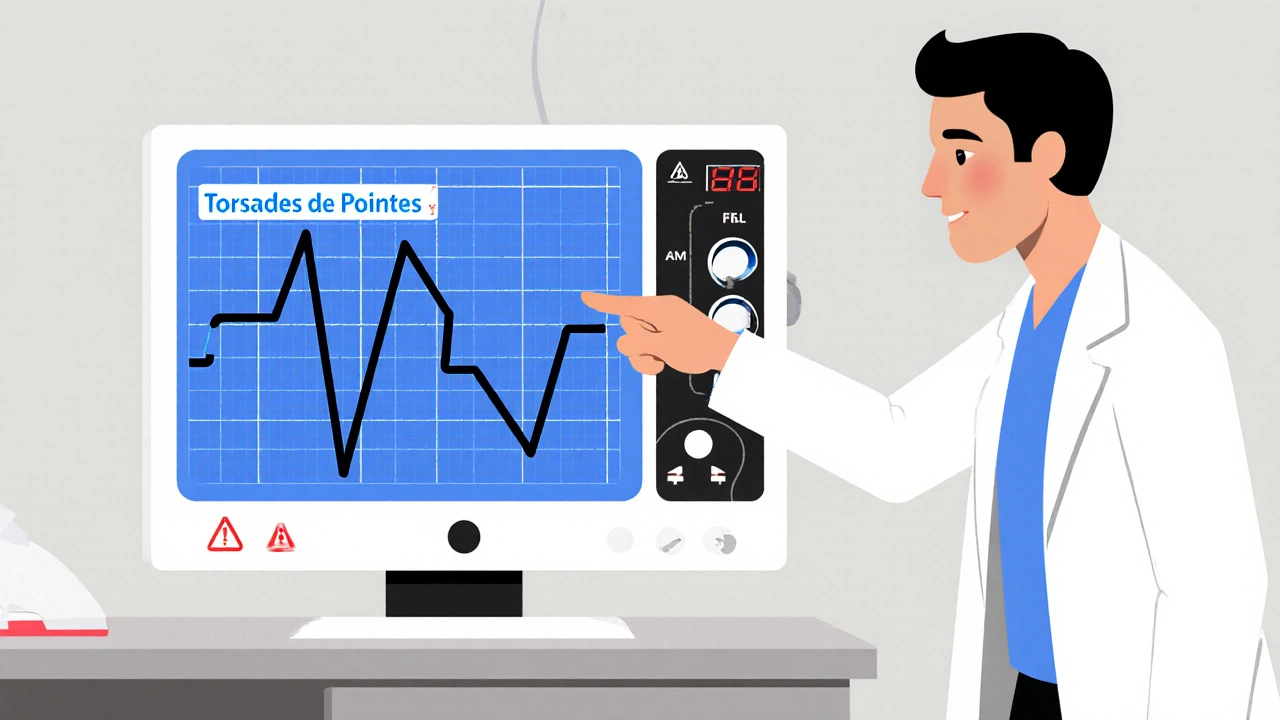TdP Prevention: How to Avoid Life-Threatening Heart Rhythm Issues
When your heart’s electrical system gets disrupted, it can trigger torsades de pointes, a rare but dangerous type of irregular heartbeat that can lead to sudden cardiac arrest. Also known as TdP, this rhythm doesn’t just scare patients—it can kill if not recognized and managed early. It’s not something that happens out of nowhere. TdP usually shows up when the heart’s QT interval gets too long, often because of medications, low potassium, or genetic risks.
Many common drugs can stretch that QT interval. Antibiotics like moxifloxacin, antifungals like ketoconazole, antidepressants like citalopram, and even some anti-nausea pills can do it. Even over-the-counter antihistamines like diphenhydramine have been linked to cases. It’s not about taking one pill—it’s about stacking risks. A person on multiple QT-prolonging drugs, with low magnesium, and already heart-damaged? That’s a perfect storm. Doctors check for this before prescribing, but you should know your own risk too. If you’re on any heart medication, or have a history of fainting, irregular heartbeat, or family sudden cardiac death, ask about your QT interval. Simple blood tests and an ECG can catch problems before they turn deadly.
TdP prevention isn’t about avoiding medicine altogether—it’s about smart use. It means knowing which drugs to avoid if you’re already at risk. It means checking your electrolytes regularly if you’re on diuretics like indapamide. It means telling your doctor about every supplement you take, because even herbal products like licorice root can mess with your heart rhythm. This isn’t theoretical. Real people have been hospitalized because no one connected the dots between their new medication and their past fainting spell. The posts below cover exactly these kinds of real-world drug interactions: how medications like antidepressants or diuretics can quietly affect your heart, how to spot warning signs, and how to talk to your doctor before it’s too late. You’ll find practical advice on managing side effects, avoiding dangerous combos, and staying in control of your heart health—one informed choice at a time.

Torsades de Pointes from QT‑Prolonging Drugs: How to Spot and Stop It
- Oct, 26 2025
- 11
Learn how to recognise Torsades de Pointes caused by QT‑prolonging drugs, assess risk factors, and apply practical steps to prevent this deadly arrhythmia.
Categories
- Health and Medicine (65)
- Health and Wellness (57)
- Medicine (37)
- Women's Health (11)
- Mental Health (10)
- Men's Health (7)
- Beauty and Wellness (4)
- Health Information (4)
Archives
- March 2026 (1)
- February 2026 (11)
- January 2026 (25)
- December 2025 (28)
- November 2025 (25)
- October 2025 (27)
- September 2025 (14)
- August 2025 (3)
- July 2025 (2)
- June 2025 (2)
- May 2025 (3)
- April 2025 (4)
- online pharmacy
- medication safety
- dietary supplement
- health benefits
- dietary supplements
- generic drugs
- prevention
- fertility
- online pharmacy Australia
- side effects
- QT prolongation
- medication side effects
- diabetes medications
- GLP-1 agonists
- nocebo effect
- brand vs generic
- treatment
- treatment options
- benefits
- connection
